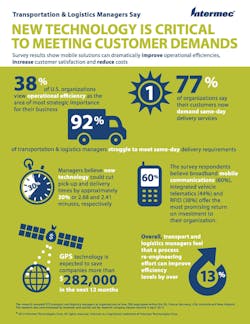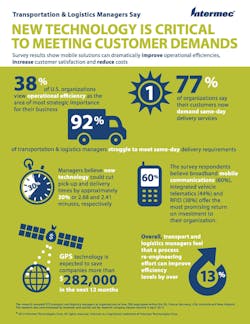Logistics Managers Struggling to Offer Same-Day Service
Operational efficiency holds the most strategic importance for 38% of the 375 transport and logistics managers surveyed last April by Vanson Bourne, a research company. The resulting study, commissioned by Intermec, found that 77% of the organizations these managers represent, located in the U.S., U.K., Germany, France, Australia and New Zealand, are being expected to meet same-day delivery requirements. Most (92%) of these managers say that meeting these expectations is placing significant pressure on their businesses to adjust.
The respondents acknowledged that arming their mobile workforce with new technology could cut their pick-up times by 30% and delivery times by 29%, savings which could help boost operational efficiency levels to meet those customer demands.
GPS, mobile and broadband communications were identified as key technologies for reducing pick-up and delivery times by 2.68 and 2.41 minutes respectively[1], providing a significant boost to the efficiency of the mobile worker.
Other Results of the Study:
- Respondents believe broadband mobile communications (60%), integrated vehicle telematics (44%) and RFID (38%) offer the most promising return on investment to their organization.
- The efficiency gains from new technology could extend to back office staff as well. The survey respondents report that they are receiving 6,677 calls per day from customers asking for order status updates.
- By providing proactive shipment updates, a process enabled by location-based and mobile technologies, these same companies believe they could eliminate 24% of these calls immediately, equating to 1,602 calls per working day.
The need to re-engineer
“Investing the time to review current processes may seem to be a daunting task, but the benefits show this is more than worthwhile,” concluded Jeff Sibio, Intermec industry marketing director for transport and logistics.
[1]Data shows that each pick-up can be cut by an average of 2.68 minutes, and each delivery reduced by 2.41 minutes on average. This equates to a 29% per cent saving on each delivery, and a 30% saving on each pick up.

